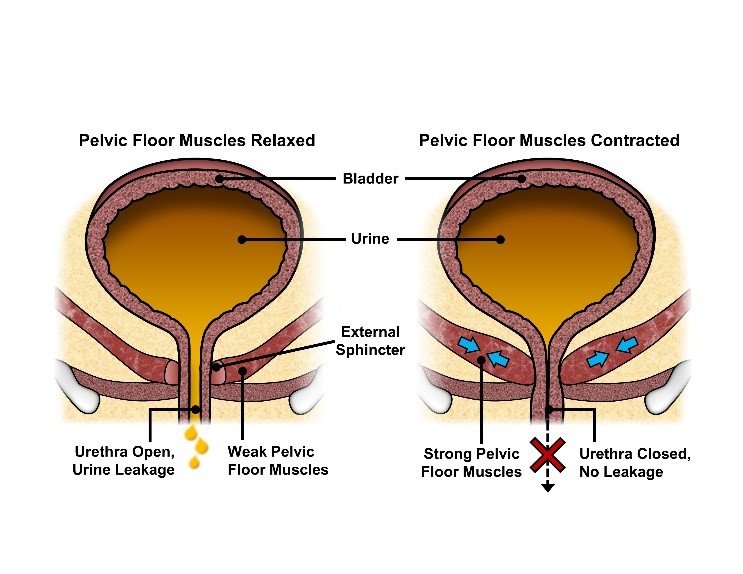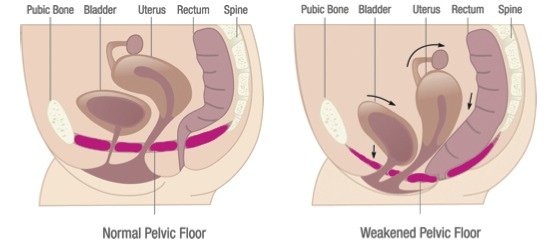You’ve probably heard about Kegel exercises for strengthening pelvic floor muscle (PFM) but have you heard of the Knack exercise?
‘The Knack’, also known as Counter Bracing Technique (CBT), is a strong and well-timed contraction of the pelvic floor muscles.
It involves contracting the pelvic floor muscles immediately before and during any increase in downward pressure on the pelvic floor.
What is the purpose of this exercise?
This preventative exercise can help you control bladder leaking – which aids to close the urinary tube (urethra) more effectively.
When you do the Knack exercise, you will need to contract/squeeze your PFM before and during any increase in pressure from within the abdomen activities, such as during coughing, sneezing and lifting objects.
Some women often lose the ability to automatically contract their pelvic floor muscles due to pregnancy and childbirth, after some types of pelvic floor surgery, or with repeated straining to empty the bowels.
By actively and correctly contracting their PFM, women can often overcome the bladder leakage that occurs with weakened pelvic floor muscle.
This strong and well-timed pelvic floor muscle contraction also may help to reduce downward movement of the pelvic floor (and prolapse) helping to decrease prolapse symptoms during events or activities that increase pelvic floor pressure.
If you have a prolapse or previous prolapse surgery, this technique is definitely worth knowing for long-term pelvic floor support and protection.

When to do ‘The Knack’?

Whenever you feel you are about to experience:
- Coughing
- Sneezing
- Lifting objects
- Blowing your nose
- Rising into standing from sitting
- Stepping down heavily
A timely exercise of the Knack will help you prevent leaking episodes when done right.
How to do ‘The Knack’ Exercise?
The Knack’s technique is similar to how you do your Kegel exercises.
You will need to contract your PFM (imagine you’re holding urination) but you need to contract the muscle immediately before and during any activities that put stress on your bladder as mentioned above.
The Knack is a quick and simple exercise technique that can help women to minimise urine leaking and also protect and reduce prolapse symptoms. Simply remember to lift and squeeze with every cough, lift or sneeze.
How to Know If I’m Doing it Correctly?
However, the pelvic floor muscles is inside of our body and it is hard to tell if we are doing it correctly or not.
You can read our Kegel exercise guide by Women’s Health Physiotherapists to guide your exercise.
If you need further information or further guidance from our Women’s Health Physiotherapist regarding the Knack exercise or Kegel exercise, feel free to reach us at Vibrance Pelvic Care Centre.
Written by:
Aleeza Hanee
Women’s Health Physiotherapist
Tel: WhatsApp Careline ![]() +011-59385962 (Kuala Lumpur, Malaysia)
+011-59385962 (Kuala Lumpur, Malaysia)
Article resources:
Laurie B (2008), Pelvic Floor Exercises Reduce Female Urinary Incontinence. Retrieved from https://www.medscape.org/viewarticle/582869
Michelle K (n.d) How to Control Bladder Leaks – Get ‘The Knack’ and Stay Dry. Retrieved from
https://www.pelvicexercises.com.au/control-bladder-leaks/
The Knack. Retrieved from
http://pelvichealthsolutions.ca/for-the-patient/pelvic-floor-weakness/the-knack/
Tammy Elizabeth (2018), Kegels and the knack pelvic floor exercise ,
http://www.bellaonline.com/articles/art18551.asp
Focus on incontinence and mastering the knack-pelvic floor control for cystic fibrosis https://www.pactster.com/blog/post/incontinence-pelvic-floor-control-cystic-fibrosis-the-knack
The Knack, Women Continence Centre. Retrieved from
https://coe.ucsf.edu/wcc/print_knack.html
